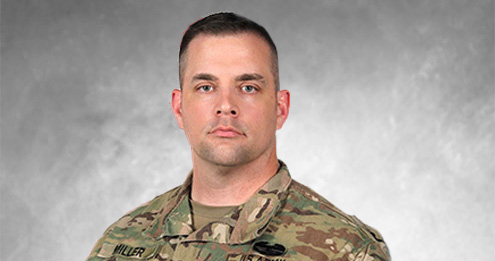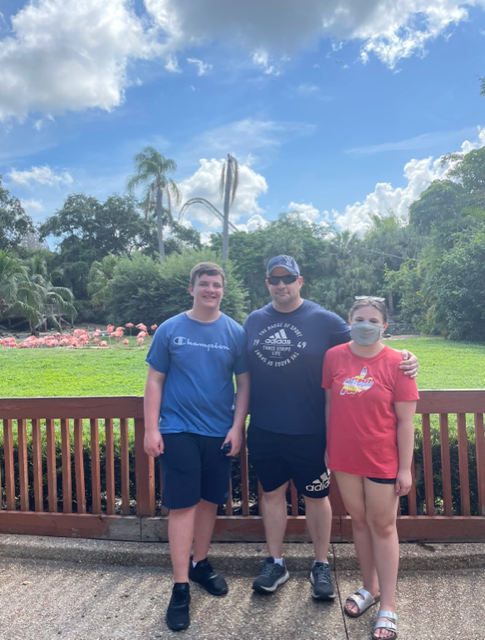- Active Duty
- Army
- Financial Management
Certification Spotlight
Credentialing success from the Service community
Certification helps an Army Captain advance his career in and out of uniform
Captain Jason Miller, United States Army
Presented with the opportunity to use Army Credentialing Assistance funding to meet his military requirements and prepare for future success, Army Captain Jason Miller jumped at the chance to earn his Certified Government Financial Manager® (CGFM®) certification.

Captain Jason Miller, United States Army
How long have you been in the Army, and what is your current rank and MOS?
I’ve been in the Army about 25 years. I began as a 13F forward observer within the Field Artillery before transitioning to become a 27D paralegal within the Judge Advocate General’s (JAG) Corps, making it to the rank of Master Sergeant. Once I earned my MBA in finance and accounting, I got an Additional Skill Identifier (ASI) for military auditor. I took a direct commission in 2011, and currently I’m an Active Guard Reserve (AGR) Captain and a 36A6T, which is a finance officer. I serve as the Deputy G8, which is the deputy finance comptroller, for the 143rd Expeditionary Sustainment Command. I advise the commander and command staff on fiscal mission requirements, policies, and procedures for all areas of budget and execution within the Command.
The CGFM automatically garners a bit of respect, and attributes a sense of competency that you’re somebody the Army can rely on to know what you’re doing and possibly come up with some new ideas and thoughts.
Describe your CGFM certification process.
I applied to the CGFM program in November 2020 but the CGFM live, virtual courses weren’t available until January 2021, so I began studying on my own. I had a leg-up because in addition to my MBA, I had already gone through the military-centric Certified Defense Financial Manager (CDFM) program and passed its three examinations to become certified as a CDFM-A. That made it much easier to prepare for the CGFM because it was very much the same for the federal side.
The CGFM program is excellent in that it offers a lot of different trainings, so I took advantage of some of the virtual trainings and purchased practice tests to see where my weaknesses were. After I finished each virtual course, I would add important questions to an Excel tab, and then I’d have the answers on another tab of the Excel worksheet, similar to flashcards. I had a coworker in the course with me who would ask me the practice questions and hold me accountable. Finally, I took a practice test at least every other day, if not daily, and they were the most helpful resource. I was able to determine my strengths and weaknesses to focus my studies before I moved on to the next section. Ultimately, I earned my CGFM certification on February 15, 2021.

Captain Jason Miller with his children at Gatorland in Orlando, Florida
What impact has the CGFM had on your career in the Army?
It has opened doors to new career opportunities and made me more competitive for promotion. In the military, we’re fortunate to have promotion requirements completely spelled out for the selection board. The regulations for financial management-coded employees within the Department of Defense (DoD) require completion of a DoD Financial Management Certification Program in order to progress within our careers, make rank, and earn more money. The CGFM has been added to that program and is one of the DoD’s most desired certifications. It automatically garners a bit of respect, and attributes a sense of competency that you’re somebody the Army can rely on to know what you’re doing and possibly come up with some new ideas and thoughts. I’ve been told by multiple field-grade officers that it’s essentially a prerequisite for certain high-level positions in our field, because of the need to understand appropriations and finance in general.
How did you find time to study and learn the exam content while also performing your required military duties?
I work for a major command at a high level, so there are multiple companies, brigades, and battalions under us with annual trainings staggered throughout the year at various locations. I can be in meetings all day in offsite locations, and by the time I’m at my hotel room, I’m ready to eat and go to bed. These are times where it’s difficult to maintain a routine like you could if you were back home, but you just have to have a mindset that this is your goal and stick to your schedule. I am very goal-oriented and my goal was always to get CGFM-certified within the timeframe that I had set, no matter what came up. I’m lucky enough to be a in a job and MOS where I’m at a desk and use a computer, so it was just a matter of adapting to the environment and making sure that I got my time in during lunch or after hours.
I also expect the CGFM will be helpful when I retire and go back to my civilian job as a principal accountant with the City of Seattle’s Department of Transportation, because the more marketable that you can make yourself, the better.
What impact did the Army Credentialing Assistance program have on your desire and ability to earn the certification?
When you have an employer offering to remove that financial burden and pay for the training portion, the testing portion, as well as future professional education requirements, that was kind of a no-brainer for me. You incur a bit of a service obligation when you use the program, but everything worked out perfectly. I also expect the CGFM will be helpful when I retire and go back to my civilian job as a principal accountant with the City of Seattle’s Department of Transportation, because the more marketable that you can make yourself, the better.
Disclaimer: The views expressed herein are those of CPT Miller and do not represent those of the DoD or the Army. His participation in this article does not constitute endorsement by the DoD or Army of the CGFM licensure, the AGA, or Pearson VUE.
